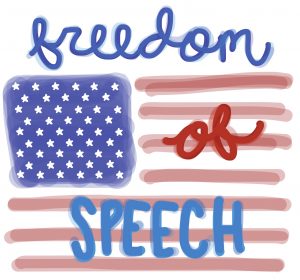Supporting
Why do many Americans support freedom of speech?
November 28, 2019
Many Americans who support the First Amendment, especially the freedom of speech, argue that this is a key aspect of the Bill of Rights because it provides protection for one of the most essential pillars that our nation was founded on — the freedom to speak openly, to express opinions without restraint or censorship, to protest publicly, and to share ideas without the government interfering or punishing citizens for contrary beliefs.
Strong advocates of the First Amendment and the freedom of speech claim that this right protects “each of us from the influence of special interests,” according to Natalie Regoli, editor in chief of ConnectUs. Freedom of speech may prevent tyranny of the majority, allows minorities the opportunity to share their beliefs openly and usually without consequence, and ensures those in power cannot become overpowering dictators. Individuals have the freedom to “express criticism of those who are in power” (ConnectUs).
While controversy in America today may be one of our nation’s greatest weaknesses, it can also be viewed as one of our largest strengths. We are a country full of diversity, varying opinions, and differing beliefs — we challenge each other’s perspectives, cause each other to re-examine our own worldviews, and we prevent our country from becoming controlled by one perspective. Freedom of speech exposes people to ideas that are contrary to their own, creating “resiliency,” as Regoli claims, and promoting the pursuit of truth, instead of citizens content to remain blinded by their own beliefs.
In addition, freedom of speech encourages “the free exchange of ideas.” Regoli explains how this works: “When a society operates in an area where free speech is given to all, then there is a more significant exchange of ideas that occur. It becomes almost impossible for those who are in power to suppress truths that they may not want to let out in the open. This process allows for progress to occur because people can learn from the experiences and perspectives of one another without worrying about the dogma of a ‘Big Brother’ element in society, either corporate or government-based.”
As Lea Despotis explores in her article “Your Permanent Record: Can You Erase It?”, freedom of speech can also promote exposure of unethical or illegal activities, shown through the example of Edward Snowden, who leaked secrets and information regarding the surveillance and privacy of American citizens to the press. This has become an area of controversy about whether Snowden’s actions were justified or not, but many strict adherents to the freedom of speech believe it was his right to uncover the unlawful actions the government was performing and to inform Americans about a situation that directly affected them.
Regoli also shares how freedom of speech can increase knowledge of a society. “When you have a chance to ask questions or share perspectives, then it creates more learning opportunities in society. This right makes it easier for all individuals to make a new discovery, suggest ideas, or exchange information freely without worrying about potential political consequences. Even if some of the ideas do not work after you get to try them, the process of testing contributes to the advancement of society as well,” she says.
While some opponents of complete freedom of speech argue that it may be used for hatred, violence, and hostility, Regoli also makes the point that free speech can allow for “peaceful changes in society.” Because individuals have the opportunity to openly share facts and opinions to persuade others to consider their view, they may be less inclined to use violence or hate speech to promote change. Regoli affirms that this certainly requires patience from all, but it may be a method to create change without violent action or speech.
Lastly, free speech can even challenge hate as opposed to increasing it. Regoli cites Peter Tatchell, a human-rights activist, who stated in Index in 2016, “[Free speech] includes the right and moral imperative to challenge, oppose, and protest bigoted views. Bad ideas are most effectively defeated by good ideas, backed by ethics and reason, rather than bans and censorship.” This supports the previous idea that freedom of speech can actually decrease violence and hatred in society in several aspects.
Those that are strong supporters of the freedom of speech simply want to protect their enumerated rights in the Constitution and are thankful to live in a country where they can share their opinions openly and work to pursue the truth.







